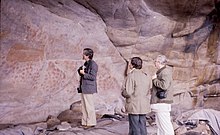Loading AI tools
South African archaeologist From Wikipedia, the free encyclopedia
John Parkington FRSSAf is an Emeritus professor in archaeology and hunter-gatherers, Paleoenvironmental reconstruction and human ecology, prehistoric art, and coastal archaeology.[1][2] He has suggested that since fish provide an important nutrient for the brain, the consumption of fish led to the emergence of the first really intelligent humans in the Western Cape region of South Africa.[3] In February 2000 South African President Thabo Mbeki mentioned the letter he had received from Parkington, regarding the protection of archaeological heritage sites, in his address at the opening of South Africa's Parliament.[4]
John Parkington | |
|---|---|
 Rock paintings at Eland's Bay Cave Photo taken in 1979. From left to right, Merrick Posnansky, John Parkington and J. Desmond Clark. | |
| Alma mater | Cambridge University |
| Known for | Hunter-gatherers Paleoenvironmental reconstruction and Human ecology Prehistoric art Coastal archaeology |
| Scientific career | |
| Fields | Archaeology |
| Institutions | University of Cape Town |
| Thesis | Follow the San: an analysis of seasonality in the prehistory of the south western Cape (1977) |
| Doctoral students | Hilary John Deacon Janette Deacon |
| Website | John Parkington at UCT |
Parkington received his education at Cambridge University where he completed a BA (Hons.) in Paleolithic Archaeology in 1966. In the same year he was appointed Junior Lecturer at the University of Cape Town (UCT) and promoted to Lecturer in 1971. He completed his MA at Cambridge in 1973 and was appointed Associate Professor of Archaeology at UCT in 1976.[1]
Parkington completed his PhD in Paleolithic Archaeology in 1977 with a thesis entitled: "Follow the San: an analysis of seasonality in the prehistory of the south western Cape" and was appointed Professor of Archaeology at UCT in 1986.[1]
He has been a visiting professor at the Department of Anthropology at the University of California, Berkeley in semesters during 1983, 1984, 1985 and 1995. In 1988 he was visiting professor at the Department of Anthropology at Rutgers University and in 1996 at Institut du Quaternaire, University of Bordeaux, Talence, France.[1]
In 2002 Parkington started the Clanwilliam Living Landscape Project, a sustainable jobs initiative, in which local inhabitants of the area were trained to interpret rock art and act as tour guides.[6][7]
Seamless Wikipedia browsing. On steroids.
Every time you click a link to Wikipedia, Wiktionary or Wikiquote in your browser's search results, it will show the modern Wikiwand interface.
Wikiwand extension is a five stars, simple, with minimum permission required to keep your browsing private, safe and transparent.